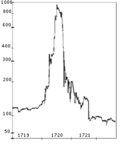The Business and Economics Portal  Business is the practice of making one's living or making money by producing or buying and selling products (such as goods and services). It is also "any activity or enterprise entered into for profit." A business entity is not necessarily separate from the owner and the creditors can hold the owner liable for debts the business has acquired. The taxation system for businesses is different from that of the corporates. A business structure does not allow for corporate tax rates. The proprietor is personally taxed on all income from the business. A distinction is made in law and public offices between the term business and a company such as a corporation or cooperative. Colloquially, the terms are used interchangeably. (Full article...) Economics (/ˌɛkəˈnɒmɪks, ˌiːkə-/) is a social science that studies the production, distribution, and consumption of goods and services. Economics focuses on the behaviour and interactions of economic agents and how economies work. Microeconomics analyses what is viewed as basic elements within economies, including individual agents and markets, their interactions, and the outcomes of interactions. Individual agents may include, for example, households, firms, buyers, and sellers. Macroeconomics analyses economies as systems where production, distribution, consumption, savings, and investment expenditure interact; and the factors of production affecting them, such as: labour, capital, land, and enterprise, inflation, economic growth, and public policies that impact these elements. It also seeks to analyse and describe the global economy. (Full article...) Selected article The Austrian school is a heterodox school of economic thought that advocates strict adherence to methodological individualism, the concept that social phenomena result primarily from the motivations and actions of individuals along with their self interest. Austrian-school theorists hold that economic theory should be exclusively derived from basic principles of human action. The Austrian school originated in 1871 in Vienna with the work of Carl Menger, Eugen von Böhm-Bawerk, Friedrich von Wieser, and others. It was methodologically opposed to the Historical school, in a dispute known as Methodenstreit, or methodology quarrel. Current-day economists working in this tradition are located in many countries, but their work is still referred to as Austrian economics. Among the theoretical contributions of the early years of the Austrian school are the subjective theory of value, marginalism in price theory and the formulation of the economic calculation problem. Selected image
Selected economyThe economy of Europe comprises about 748 million people in 50 countries. Throughout this article "Europe" and derivatives of the word are taken to include selected states whose territory is only partly in Europe, such as Turkey, Azerbaijan and Georgia, and states that are geographically in Asia, bordering Europe and culturally adherent to the continent, such as Armenia and Cyprus. There are differences in wealth across Europe which can be seen roughly along the former Cold War divide, with some countries breaching the divide (Greece, Portugal, Slovenia, the Czech Republic, Lithuania, Latvia and Estonia). Whilst most European states have a GDP per capita higher than the world's average and are very highly developed, some European economies, despite their position over the world's average in the Human Development Index, are relatively poor. Europe has total banking assets of more than $50 trillion; the United Kingdom accounts for 25% ($12 trillion) of Europe’s total banking assets followed by France with 20% ($10 trillion) and Germany with 15% ($7 trillion). Europe Global assets under management is more than $20 trillion, with the United Kingdom accounting for more than 40% ($8 trillion) of Europe’s total AUM followed by France with 20% ($4 trillion) and Germany with 12% ($2 trillion). London and Paris are by far the economically strongest cities in Europe, each with a GDP exceeding $1 trillion. London and Paris are major economic hubs in Europe, with the London Stock Exchange and Euronext Paris, the two largest stock exchanges in Europe by market cap. (Full article...) Selected quote"At the same time, pecuniary externalities have significant welfare consequences when there are distortions in the economy (e.g., from monopolies, technological externalities, or distorting taxes). An important determinant of the optimal tax on one commodity is for instance a calculation of its indirect effect on government revenue raised from other taxes. It has not, however, been widely recognized that the distortions that arise in economies in which there is imperfect information and incomplete markets for practical purposes, all economies result in there being real welfare consequences of what would otherwise be viewed as purely pecuniary effects. As a result, economies in which there are incomplete markets and imperfect information are not, in general, constrained Pareto efficient. There exist government interventions (e.g., taxes and subsidies) that can make everyone better off. Moreover, the distortions that arise from imperfect information or incomplete markets often look analytically like externalities of the familiar technological sort, and viewing them in this way helps identify the welfare consequences of government interventions."
TopicsRelated WikiProjectsDid you know (auto-generated) -
On this day in business history
General imagesThe following are images from various business-related articles on Wikipedia.
More did you know
Business news
SubcategoriesRelated portals
Things you can doUrgent and important articles are bold
WikimediaThe following Wikimedia Foundation sister projects provide more on this subject:
SourcesDiscover Wikipedia using portals |

















































